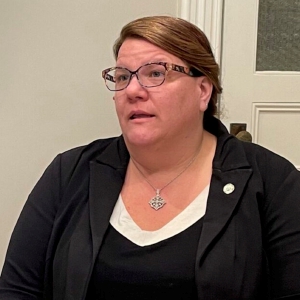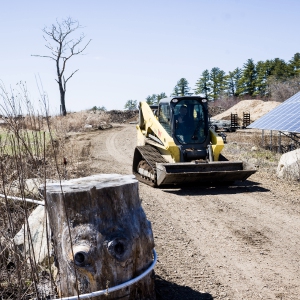How much for that copy? Record requests can prove costly
| Published: 03-10-2019 6:23 PM |
The last thing Gilford officials say they want is to wind up in court. Especially for something as minor as paper copy fees.
That’s why Town Administrator Scott Dunn decided to put forward an initiative in Gilford to lower the amount charged per page for paper copies of public records obtained through Right-To-Know requests.
The law now states that a person requesting a copy of public documents may be charged only the “actual cost” of providing the copy. Municipalities are charged with interpreting that themselves.
A Monitor evaluation of 37 towns and cities found that cost varied greatly between governing bodies. The lowest cost for a copy was in Salisbury at 5 cents per page, while the most expensive towns were Deering, Tilton and Bristol at $1 a page. Some towns, like Canterbury and Boscawen, charge 15 cents for a copy. Weare charges 40 cents, and several charge 50 cents.
In Franklin, copies cost $1 for the first page and 25 cents for every page after. Barnstead’s copies cost 40 cents for the first page and 30 cents after. In Sutton, it’s 25 cents per copy and residents are asked to drop their payment in an honor box next to the copy machine.
The cost of copies has been an ongoing issue in the state as crusaders of public access say that fees are prohibitive to people trying to get their hands on records.
“To me, it all comes back to, If you look at Staples's copy shop, they’re charging a dime a page,” said David Taylor, Vice President of Right-To-Know New Hampshire. “They’re still making a profit otherwise they wouldn't be in business.”
The price in Gilford now is 50 cents per page – and Dunn wants to see it brought down to 25 cents, a price he thinks reflects the cost of the paper and the maintenance and lease on the town copy machine.
Article continues after...
Yesterday's Most Read Articles
 Helen Hanks resigns as Department of Corrections commissioner
Helen Hanks resigns as Department of Corrections commissioner
 Historic Tilton Island Park Bridge will be reopened unless Trump takes back a federal grant
Historic Tilton Island Park Bridge will be reopened unless Trump takes back a federal grant
 ‘I thought we had some more time’ – Coping with the murder-suicide of a young Pembroke mother and son
‘I thought we had some more time’ – Coping with the murder-suicide of a young Pembroke mother and son
 As Canadian travel to the U.S. falls, North Country businesses are eyeing this Victoria Day weekend to predict impacts in New Hampshire
As Canadian travel to the U.S. falls, North Country businesses are eyeing this Victoria Day weekend to predict impacts in New Hampshire
 Owners of Lewis Farm prepare to bring back agritourism after long dispute with city of Concord
Owners of Lewis Farm prepare to bring back agritourism after long dispute with city of Concord
“I looked at the big picture and realized we would be hard-pressed to justify a 50 cent fee if it was legally challenged,” he said. “The law requires that fees be based on our reasonable cost – I didn't feel like our reasonable cost could justify a 50 cent per page copy fee.”
States like Massachusetts have passed legislation that requires towns and cities to charge no more than five cents a page for black and white copies. There have been several efforts in New Hampshire to pass similar legislation, but all have failed.
Taylor said his organization files its own lawsuits or supports others in Right-To-Know cases. He said many people come to them with questions about pricing for copies.
“A reoccurring theme is that people are concerned with the cost,” he said. “They think they're too high.”
A bill in the New Hampshire House seeks to disallow municipal bodies from charging a fee to inspect records. Some towns and cities have tried to charge record-seekers to cover the cost of accessing documents because town employees have to spend time gathering the material.
“It depends on how much time it takes us to compile the request,” said Belmont Town Administrator Jeanne Beaudin. “Requests that are more time consuming may cost more.”
In many cases, time is also spent redacting information from the material that is protected from public inspection. While trained town employees can redact simple things like phone numbers and addresses, a lawyer is needed sometimes to handle more sophisticated redactions, he said.
“Oftentimes costs are used as a way of pushing back against a request because the towns know they're never going to recover the real cost of providing access to records because of those high redaction costs,” Taylor said.
Rep. Michael Sylvia of Belmont, a lead sponsor of the bill, said it addresses only the inspection of records and would not keep towns from charging to make physical copies. Either way, municipalities should not profit off of fulfilling records requests, he said.
“If you want to charge fees for retrieving documents, then it’s not beneficial to have the documents stored in an efficient and easy way to find,” he said. “Frankly, they should be online.”
A similar bill failed in the Senate last year, Sylvia said. This iteration cleared the judiciary committee last week in a 20-0 vote that it ought to pass. It is scheduled to reach the House floor Thursday,
Every town the Monitor spoke to said digital records are free.
More and more towns are making a wider collection of their records available online, making it easier for the public to access them and for employees to organize and retrieve them.
But even if someone is seeking digital copies, they might have to spend some money. In Manchester, digital documents may only be transferred on city-provided electronic media storage devices, such as CDs, DVDs and thumb drives. The city charges for these devices.
In Hopkinton, Town Administrator Neal Cass said it costs 50 cents per page for copies but requests have slowed as they convert more documents into electronic formats.
“Anything modern and all our property history files have been scanned and are digital,” he said.
There is also some wiggle room with the fee for copies.
Cass said even if someone requests 10 pages, that does not necessarily mean they have to pay $5 at 50 cents apiece.
“We just want to cover our cost,” Cass said.
]]>







 ‘Friends of the Beav’ want people to see the city’s golf course differently
‘Friends of the Beav’ want people to see the city’s golf course differently  ‘We chose to become more’: NHTI holds 75th commencement
‘We chose to become more’: NHTI holds 75th commencement ‘I hate to leave’: Three-alarm fire in Loudon burns centuries-old home to the ground
‘I hate to leave’: Three-alarm fire in Loudon burns centuries-old home to the ground Photos: Signs of spring
Photos: Signs of spring
